Alumni Profiles
Fall 2022
From taking the lead in newborn medicine to forging critical connections to move research from the bench to the bedside, our alumni are making an impact.
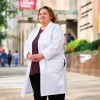
Compassion Champion
Dr. Camilia Martin
Chief of Division of Newborn Medicine
Dr. Camilia Martin (M.D. ’92) remembers being in study hall as a high school senior and seeing a picture of an in-utero fetus in Life magazine. She fell in love, recognizing the then-burgeoning field of neonatology would cross over medicine, technology, ethics and public health. “It had everything anyone would be interested in medicine for,” Dr. Martin recalls. “I made sure I could pronounce ‘neonatology’ and since then everything has been a means to that end.”
Neonatologist Dr. Alfred Krauss (M.D. ’63) became an early mentor, welcoming her along with small groups of other Weill Cornell Medical College students to talk about everything from classic papers on neonatal cardiac physiology to the earliest descriptions of eye disease. “ I wanted to be connected to the NICU,” Dr. Martin says, and she went on to co-author her first research paper with Dr. Krauss.
In May, Dr. Martin became chief of the Division of Newborn Medicine at Weill Cornell Medicine and NewYork-Presbyterian Komansky Children’s Hospital, returning to her alma mater after serving as associate director of the neonatal intensive care unit at Beth Israel Deaconess Medical Center in Boston and associate professor of pediatrics at Harvard Medical School. Dr. Martin is also an alumna of Weill Cornell Medicine’s Travelers Summer Research Fellowship Program, which provides exposure to medicine, research experience and mentorship to premedical students from backgrounds underrepresented in the STEM fields.
“When you’re from a family and a situation where getting a higher education is not necessarily assumed, and you may not even know where the dollar may come from to pay for that...your experience of getting into college is not necessarily supplemented with opportunities that other folks may have had,” Dr. Martin says, recalling how Travelers brought students on to campus and let them interact and learn from people in the medical field. “Weill Cornell Medicine has always had that compassion and understanding of that need.”
As a scientist, Dr. Martin looks forward to advancing neonatology in all areas, ranging from her own field of nutrition to medication delivery. For instance, often drugs are scaled down for infants from dosages calibrated for adults and older children because of a lack of data in the newborn population, leaving a field ripe for further exploration.
A philosophy of embracing inquisitiveness is a theme she frequently returns to. “It’s that continual cycle of asking questions, loving what you’re doing, staying curious, that makes you better and better — a better division, a better NICU, and a better physician.”
—Tracy Vogel

Forging Critical Connections
Dr. Michele Park
Life Sciences Investor and Partner, NEA
Dr. Michele Park (Ph.D. ’01) sees her role as life sciences investor and partner at New Enterprise Associates (NEA) as a bridge over a gap — connecting the critical discoveries made in the lab with funding and investor guidance and expertise to help bring them to patients.
“It’s very exciting because you’re taking new ideas and discoveries and helping turn them into potential therapeutics that could impact the lives of so many,” Dr. Park says. “I was at the bench doing basic science research, and now I see what you can do with the right people, the right team, and the right investor support.”
While studying molecular biology at Weill Cornell Graduate School of Medical Sciences, Dr. Park quickly grew interested in the translation of basic research in the field to drugs in the growing pipelines of early-stage, emerging biotech companies.
Though she had never taken a finance course, she found she could learn those skills on the job. After completing her Ph.D., Dr. Park became an equity research analyst covering the biotech sector for Credit Suisse and Piper Jaffray, and then moved into an investing role at the venture capital firm Clarus Ventures. There, she led a novel hybrid philanthropy/investment initiative, the Clarus Cancer Fund, which would commit the firm and investors to donating significant shares of their profits toward cancer research.
After joining NEA last year, Dr. Park is again working with early-stage innovators and lauds the company’s commitment — with a portfolio of over 80 women founders and CEOs — to female entrepreneurs. Having been the only female investing professional in other firms prior to joining the NEA team, Dr. Park is dedicated to supporting women as innovators, entrepreneurs, and co-investors.
Still in touch with mentor Dr. Andy Koff, whose lab at Memorial Sloan Kettering she studied in, her current role also returns her to her science roots. “The identification of these breakthroughs that can become novel medicines, being part of that is very exciting for me,” she says. “Being able to help navigate a company’s path while growing value and ultimately bringing novel and effective medicines to patients makes this job incredibly rewarding.”
—Tracy Vogel

On the Frontiers of Applied Biology
Dr. Dave Lennon
CEO of Satellite Bio
Dr. Dave Lennon (Ph.D. ’01) still gets emails from parents of children with the rare
disease spinal muscular atrophy who were treated with a new, regenerative gene therapy produced while he was at the helm of Novartis Gene Therapies. Approximately 2,000 children received treatment, he notes.
“They send me videos of their kids growing up whose lives were saved and changed forever, and that ability — that direct impact on patients — is what primarily drew me out of academia to the business side of the equation,” Dr. Lennon says.
His career at the intersection between research, development and commercialization of medicines for patients is an outgrowth of his time studying molecular biology at Weill Cornell Graduate School of Medical Sciences. “One of the advantages of Weill Cornell Medicine is being in a place with strong hospital programs around you always,” he says. “I took that opportunity to think about applied biology and applied medicine in a translational setting, which really sparked my interest.”
Last year, Dr. Lennon became CEO of startup Satellite Bio, which is developing a new approach to generating synthetic tissues for use as therapeutics. The process involves creating living tissue by putting cells into a biomaterial scaffold, which can then be implanted into patients to take on the roles of injured, damaged cells.
The first target of the technique is liver disease. “I’ve always enjoyed working on the frontiers of applied biology that allow us to think about how to apply all the learning over the past couple decades to actually treating patients,” Dr. Lennon says. “I’ve done that a couple times over my career and I’m excited to try to do it now with this more advanced technology.”
After beginning his career in a laboratory of human genetics, Dr. Lennon quickly made what he saw as a natural transition to business.
“I always preach that the foundations of the scientific method are excellent for solving any kinds of problems, including business problems and leadership problems,” he says. “Understanding context, setting a hypothesis and testing that, reaching conclusions and iterating on that process works — whether you’re trying to solve a deep scientific problem or a business problem.”
—Tracy Vogel
Photo: Michael Cogliantry; Illustrated Portraits: Matthew Cook
Fall 2022 Front to Back
-
From the Dean
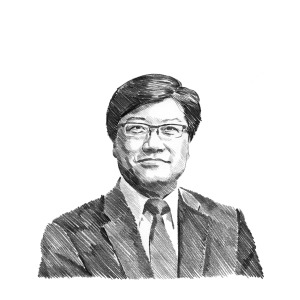
A Message from the Dean
As an academic medical center, our tripartite mission is what drives us forward: we thrive on providing world-class care to our patients, making groundbreaking discoveries that are changing the future of medicine, and teaching the health care leaders of tomorrow. -
Features
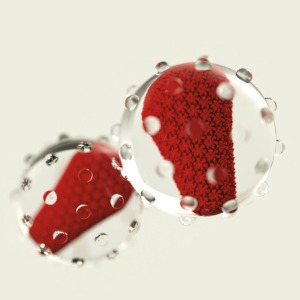
The Search for a Cure
Weill Cornell Medicine scientists aim to liberate those living with HIV by subduing the virus for good. -
Features
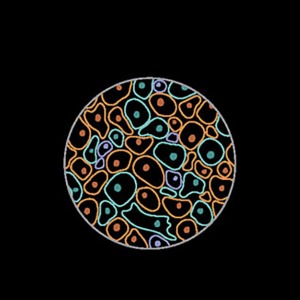
Evasive Action
Could interrupting the evolutionary process of mutating cells hold the key to vanquishing cancer? Researchers led by Dr. Dan Landau are on the case. -
Features

New Frame of Mind
Psychiatrist and neuroscientist Dr. Conor Liston (M.D. ’08, Ph.D.) and his team are poised to upend the way mental health disorders are diagnosed and treated. -
Notable
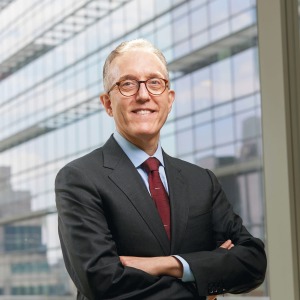
New Cancer Director
Internationally acclaimed medical oncologist Dr. Jedd Wolchok, whose innovations in immunotherapy revolutionized melanoma treatment, was recently recruited as the Meyer Director of the Sandra and Edward Meyer Cancer Center at Weill Cornell Medicine. -
Notable

3 Questions
Dr. Jay Varma, director of the new Center for Pandemic Prevention and Response, explains why an interdisciplinary approach is critical. -
Notable

Overheard
Weill Cornell Medicine faculty members are leading the conversation about important health issues across the country and around the world. -
Notable

Notable News Briefs
Faculty appointments, honors, awards and more — from around campus and beyond. -
Notable

Dateline
In the global scientific effort to understand vaccine and natural immunity to SARS-CoV-2, Weill Cornell Medicine’s location in Qatar, a country of only a few million people, has been making an outsized contribution. -
Grand Rounds
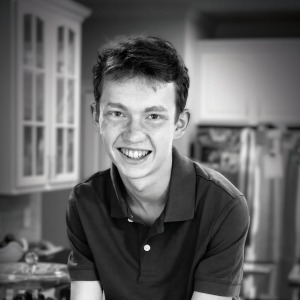
Chiari Malformation
When is Surgery Necessary? -
Grand Rounds

3 Questions
Dr. Susan Loeb-Zeitlin, who worked with a multidisciplinary team to launch the new Women’s Midlife Program, shares insights about making menopause manageable. -
Grand Rounds
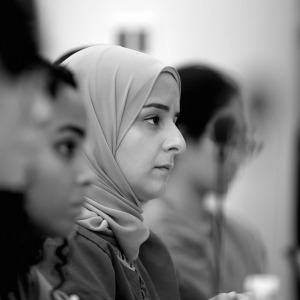
Social Impediments to Health
The murder of George Floyd and the resulting national reckoning on race, along with the disproportionate impact of COVID-19 on communities of color, galvanized creation of the Anti-Racism Curriculum Committee at Weill Cornell Medicine. -
Grand Rounds

Grand Rounds News Briefs
The latest on teaching, learning and patient-centered care. -
Discovery

COVID-19 and Diabetes
Basic science and clinical investigations converge to offer answers. -
Discovery

Development of Schizophrenia
Multiple changes in brain cells during the first month of embryonic development may contribute to schizophrenia later in life. -
Discovery

Findings
The latest advances in faculty research, published in the world’s leading journals. -
Alumni
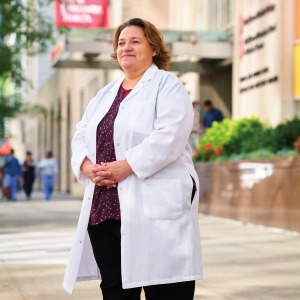
Profiles
From taking the lead in newborn medicine to forging critical connections to move research from the bench to the bedside, our alumni are making an impact. -
Alumni
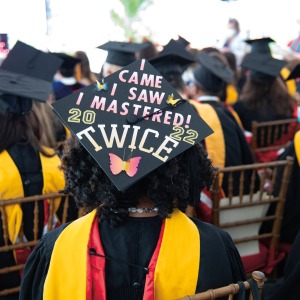
Notes
What’s new with you?
Keep your classmates up to date on all your latest achievements with an Alumni Note. -
Alumni

In Memoriam
Marking the passing of our faculty and alumni. -
Alumni
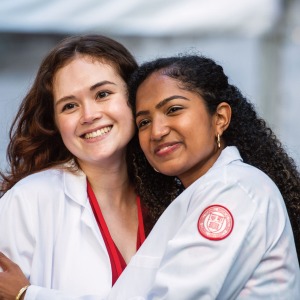
Moments
Marking celebratory events in the lives of our students, including Match Day, the White Coat Ceremony and Graduation. -
Second Opinion

A New Lens
What’s one way that medical education must change to better address health inequities? -
Exchange
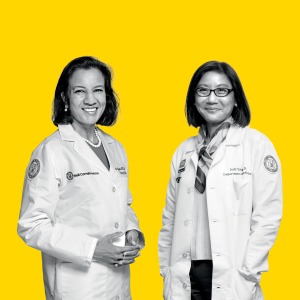
Pivot Points
Two women leaders at Weill Cornell Medicine whose professional paths have connected discuss the power of mentorship — for themselves and other women in academic medicine. -
Muse
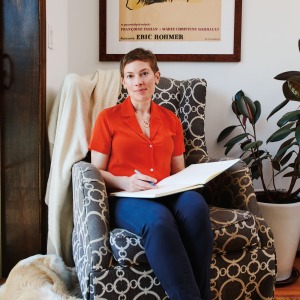
Two Forms of Truth
Dr. Laura Kolbe, whose poetry has garnered notable honors, talks candidly about how her writing helps her build a bridge to her work as a clinician. -
Spotlight

Building Connections
Dr. Kathleen Foley (M.D. ’69) has been bringing people together throughout her expansive career as a specialist in pain management and palliative care for cancer patients.